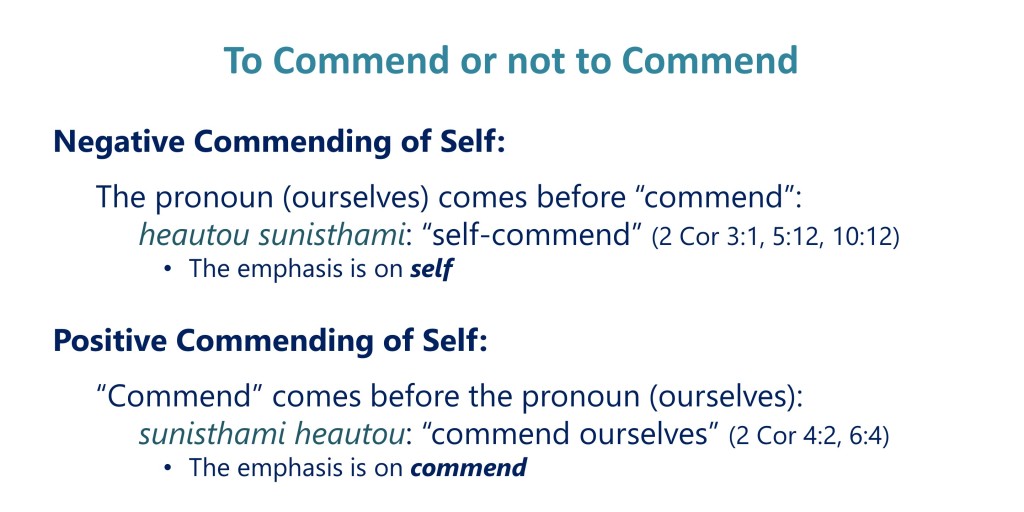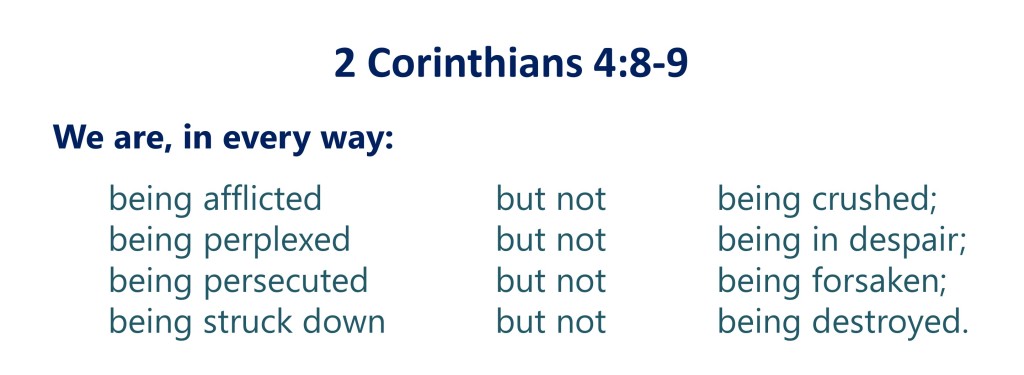 Last week, we finished with Paul and Timothy saying how all Christians (“we all”) experience God’s glory. Right now, that glory comes to us like an image that we see reflected in a mirror (2 Corinthians 3:18). This is God’s glory coming to us in an indirect way, hidden, so we do not die from His full glory because we are still tainted with sin.
Last week, we finished with Paul and Timothy saying how all Christians (“we all”) experience God’s glory. Right now, that glory comes to us like an image that we see reflected in a mirror (2 Corinthians 3:18). This is God’s glory coming to us in an indirect way, hidden, so we do not die from His full glory because we are still tainted with sin.
But we are being transformed “from glory into glory” (2 Corinthians 3:18), from experiencing God’s glory indirectly now to experiencing it fully in eternity. Paul and Sosthenes also spoke of this: “For now we see in a mirror, indirectly, but then [on the Last Day] face to face” (1 Corinthians 13:12).
Paul and Timothy now continue to contrast themselves against the false teachers of Jewish ancestry (2 Corinthians 11:22) who had come in with letters of recommendation (2 Corinthians 3:1).
The Gospel Drives the Pastoral Ministry
Read 2 Corinthians 4:1-2
- Who are the “we” in these verses?
“lose heart”: Greek, egkakeo. This is not a common verb. It does carries with it the idea of becoming weary, and despairing because of that (Ephesians 3:13). In that sense, it means “lose heart.” But it also means “not failing” or “acting incorrectly.” In these two verses, “acting incorrectly” makes more sense.
In the next verse, 2 Corinthians 4:2, Paul and Timothy assert that they are acting with integrity. Later in 2 Corinthians, we learn that some in Corinth had even accused Paul of being deceitful (12:16). Against such accusations, Paul and Timothy are saying that they have not acted wrongly (not that they haven’t “lost heart”), and because of that, they have renounced the hidden things of shame.
- What drives Paul and Timothy not to act incorrectly? (vs. 1)
- Extrapolate this to what motivates the Christian in his sanctification (to live the life of faith).
“cunning”: Greek, panourgia, meaning deception, trickery, and cunning methods. The Church is to be up front, not changing or disguising “the ministry” of “the mercy of God.”
- What temptation exists today for congregations and pastors because they exist within a capitalistic churchly culture?
- Unlike the false teachers, how do Paul and Timothy operate?
Excursus: To Commend or not to Commend, that is the Question
Last week, we learned that Paul and Timothy said, “Are we beginning to commend ourselves again?” (2 Corinthians 3:1, ESV). The implied answer was, “No.” But here, in 2 Corinthians 4:2, Paul and Timothy now say, “…we would commend ourselves…” Which is it? Are they commending themselves or not?
To notice the difference, we must notice the reverse word order that Paul and Timothy use in the original Greek text, which our English translations do not bring out.
“Self-commending” reveals itself by measuring and comparing oneself with others at their expense. This self-commending seeks one’s own interests and glory, and boasts in one’s own accomplishments (2 Corinthians 10:12-17). Paul and Timothy consider such “self-commending” as foolish and untruthful, for it takes away from what God is doing.
“Commending oneself” emphasizes “commend,” not “self.” In this section, it was Paul and Timothy living “by the open statement of the truth”; that was their commendation. Those “having this ministry by the mercy of God [pastors]” commend themselves when they remain faithful despite hardship; when they show qualities such as purity, patience, and love; when they speak the truth; and when they live for the benefit of others (2 Corinthians 6:4-10). In such ways, pastors in the Church live out the characteristics of Jesus, the “image of God” (2 Corinthians 4:4).
“Self-commending” counts for nothing. What matters is the one whom the Lord commends (2 Corinthians 10:18).
————
Read 2 Corinthians 4:3-4
- If the Gospel that Paul and Timothy preached and taught was “veiled,” why was that so?
- Reconcile “the god of this world has blinded the mind of unbelievers” with “I have become all things to all people, that by all means I might save some” (1 Corinthians 9:22).
Read 2 Corinthians 4:5
- Pastors are to preach whom and/or what to the congregation?
- Whom do pastors serve? For what purpose?
Read 2 Corinthians 4:6
- Through whom does “light shine out of darkness” so they may “give the light of the knowledge of the glory of God in the face of Jesus Christ”?
“Let the light shine out of darkness”: This is a paraphrase of God creating light during creation (Genesis 1:3-4). Although God uses pastors in the Church, through whom He “gives light,” the power of such conversion is from God, not pastors. As God’s spoken word created light during creation, so does His spoken word create light in the hearer, which Paul and Timothy describe as a “new creation” (2 Corinthians 5:17). In the Old Covenant, Prophet Isaiah spoke of light’s victory over darkness as a sign of salvation (Isaiah 9:2, 49:6, and 60:1-3).
And, of course, Paul directly experienced the light of Christ, converting him on the road to Damascus (Acts 9:3, 26:13). It is worth noting that Paul called this conversion experience an ektroma, a miscarriage or abortion (1 Corinthians 15:8). In the same way that a miscarriage is not a normal physical birth, Paul’s spiritual birth was not normal. In the passage, the normal way God “gives light” is through His pastors when they speak God’s word to His people.
Jars of Clay that Deliver the Gospel
Read 2 Corinthians 4:7
In 2 Timothy 2:20, Paul described the Church on earth as a “large house” that had many vessels (or jars), some of silver and gold, some of wood and clay. Gold and silver vessels were “honorable” because they were expensive, and so people used them for “honorable” purposes. But wooden and clay containers were cheap and fragile (see Leviticus 11:33 and Lamentations 4:2); they were “dishonorable” because they held garbage or excrement. Sometimes, people even threw the containers out with their contents.
But 2 Corinthians 4:7 contrasts what Paul and Timothy look like (based on events in their lives) with the contents they bring. Although events in their lives make them seem to be nothing more than a jar holding human excrement, bring a “treasure.”
- How do events in Paul and Timothy’s lives testify that conversion, when they “give the light” of Christ, is not because of their power?
Read 2 Corinthians 4:8-9
These four statements first list Paul and Timothy’s sufferings. The second part of each statement is the opposite of the expected effect of such suffering. Even more, these statements are all in the present tense, describing Paul and Timothy’s current reality. They are being afflicted, perplexed, persecuted, and struck down. But God’s power is also a present-tense reality for them, and so they are not being crushed, in despair, forsaken, and destroyed.
Read 2 Corinthians 4:10-11
Verse 10 is a continuation of verses 8-9, which are also in the present tense.
“the death of Jesus”: Here, “death,” is from the Greek word, nekrosis. Normally, thanotos is used to mean “death,” which vs. 11 will use. Although nekrosis is a noun, it refers to the process of dying or the process of death. This “process of dying” is not the Christian being baptized into Christ’s death (Romans 6:3) but is, instead, what causes death in this fallen world.
- What are Paul and Timothy always (without respite) carrying (present tense) in their bodies?
- To whom does this process of dying, taking place within Paul and Timothy, point? Why?
“be manifested”: This is a passive verb. God is manifesting the life of Christ through their suffering, through their “process of dying.”
Read 2 Corinthians 4:11
Here, the text now uses thanatos for death, meaning “death.” Although the “we” of this verse clearly refers to Paul and Timothy, the implications of this verse does apply to all Christians.
- What is taking place for those who now live in this fallen world?
- What is different for the Christian?
- Discuss: How can a Christian use his “always being given over to death” as a way to point another to the life that one has in Christ?
Read 2 Corinthians 4:12
- Because death was at work in Paul and Timothy, what was the result for the Corinthian congregation?
- Discuss: How the pastor can use the Law, “the process of dying,” of “always being given over to death,” to bring someone the Gospel, the “life of Jesus.”
Paul and Timothy’s Faith
Read 2 Corinthians 4:13-14
Here, Paul quotes David from Psalm 116:10 (in our Old Testament) from the Greek-language Old Testament, the Septuagint.
Greek Septuagint: “I believed, therefore I spoke…”
Hebrew Masoretic Text: “I kept my faith, even when I said…”
The Septuagint numbers its psalms slightly differently. In the Septuagint, Psalm 116:10 is not in the middle of a psalm but the beginning of another, Psalm 115. That Psalm begins with “I believed, therefore I spoke” and then goes on to say, “Precious before the Lord is the death of His holy ones.” This psalm speaks of someone, David, who has been faithful to God, who has served as God’s slave, and has trusted in God to save him from death.
When the first verse of a Psalm was quoted, that was “shorthand” way to represent that psalm. For example, when St. Luke has Jesus quoting the first verse of Psalm 22 on the cross, that was Luke’s way of saying that Jesus was praying Psalm 22. Here, Paul uses Psalm 115 from the Septuagint to transition from death into life.
- Because of what Paul and Timothy believe, what do they speak? (vs 14)
- Because God raised Jesus from the dead, what does that mean for all Christians (“us with you”)?
Read 2 Corinthians 4:15
- What is “all for your sake”?
“as grace extends to more and more people it may increase thanksgiving, to the glory of God”: It the Greek, this is a wordy, complicated phrase. However, a “wooden” translation will allow us to see more of what is taking place:
…that grace, having increased thanksgiving through the many, may abound into the glory of God.
God’s grace is the cause this increased thanksgiving, not the people giving the thanks. “The many” was a Hebraic expression to mean “all people.” This increased thanksgiving takes place because God’s grace extends to all people; that’s why such thanksgiving takes place “through” them, not because of them. This thanksgiving taking place here will later take place in eternity, as the end of 2 Corinthians chapter 3 said, “…from [indirect] glory into [full] glory.”



